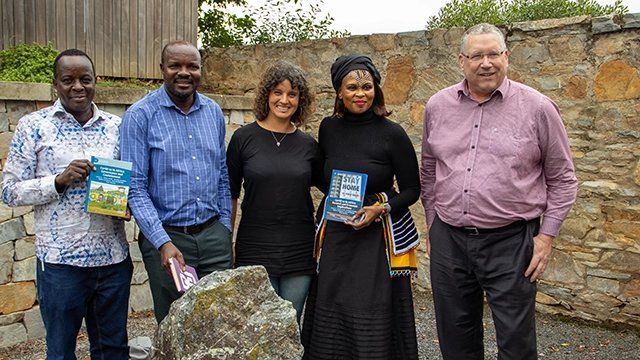
By: The Division of Communications & Advancement
The Rhodes African Studies Centre (RASC) recently launched two key books, namely, Covid-19 in Africa: Social and Economic Implications and Covid-19 in Africa: Governance and Containment, both published by Palgrave.
Edited by our Dean of Humanities and Director of the African Studies Centre (RASC), Professor Enocent Msindo and his co-editors, namely Professors Susan Arndt (University of Bayreuth, Germany), Yacouba Banhoro (University of Joseph Ki-Zerbo, Burkina Faso), and Peter Simatei (Moi University, Kenya), presented insights into the impact of the Covid-19 pandemic in Africa.
Chaired by a renowned journalism lecturer, Thandeka-Gqubule Mbeki, Professors Msindo and Simatei (currently a Visiting Fellow at RASC) and Dr Dominique Santos were subjected to very interesting questions from Gqubule-Mbeki, members of faculty and students present at this packed event.
An interesting highlight was the presence of Professor Rüdiger Seesemann, the Dean of Africa Multiple, a collaborative venture that includes the RASC. Professor Seesemann made some opening remarks, affirming the contributions of scholars from the Cluster of Excellence, Africa Multiple, towards realising the research work.
A recurring theme was Africa's historical struggle with colonialism and socio-economic disparities, which Covid-19 has both reflected and exacerbated. Nonetheless, a key point was the emphasis in the two volumes on what Professor Msindo referred to as “the ingenuity of agency” in the face of a myriad uncertainties.
Dr Santos emphasised the need for adaptability, pointing out how the pandemic has spurred innovative responses to the disruptions in daily life. Her chapter looks at the ways in which subsistence fishing communities on sea adapted to efforts to immobilise them. They organised fishing ventures in the deep of the night. Some negotiated with the army and police that enforced lockdowns, and some resorted to religious ways of dealing with the situation they found themselves in.
The event also shed light on various African nations' governance and containment strategies, revealing a tapestry of community initiatives in response to the government’s emergency regulations.
This scholarly gathering not only facilitated robust intellectual debates but also underscored Africa’s global interconnectedness in addressing emergency challenges.
There was not enough time to respond to many issues that emerged from the launch. However, the key takeaway was that there was a need for even more research on the various other dimensions of Covid-19 in Africa.
The launched books are resources for policymakers, researchers, and activists addressing the pandemic's effects.
The event called for action to address the challenges facing Africa and the world.
